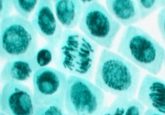Preclinical study offers rationale for testing PI3K/mTOR inhibitors in uterine leiomyosarcoma
A new study carried out to further explore various subtypes of rare uterine sarcoma has concluded that the ribosomal protein P-S6S240 could represent a marker of poor prognosis in leiomyosarcoma. Additionally, the investigation highlighted that individuals with tumors expressing this protein may respond to PI3K/mTOR inhibitors. Full details were published recently in Clinical Cancer Research.
Discussing the premise of the study, lead investigator Frédéric Amant (Leuven Cancer Institute, Belgium) commented: “We wanted to generate a clear view on the presence of targetable proteins in all subtypes of uterine sarcomas, with the aim of improving treatment options for these patients. Identifying biomarkers is crucial because novel treatments are expensive, underscoring the importance of patient selection.”
The investigating team assessed five proteins in 288 samples of uterine sarcoma. In terms of subtypes, these samples included 157 leiomyosarcomas, 52 benign uterine stromal tumors and 41 normal uterine tissues. The remaining samples consisted of endometrial sarcomas, adenosarcomas and other undifferentiated types of uterine sarcoma.
These analyses uncovered that activated P-S6S240 is more often found expressed in high-grade tumors when compared with low-grade tumors – 32% vs 9%, respectively. Given that P-S6S240 is involved in the PI3K/mTOR cell signaling pathway, the team went on to test an investigational dual PI3K/mTOR inhibitor in five leiomyosarcoma patient-derived xenograft models.
After treatment with the inhibitor, tumor shrinkage was observed in two models, a stable tumor in the third model and a decrease in tumor growth in the fourth. The model that did not respond was negative for the activated S6 protein, while all responding models were positive for this protein, suggesting that the activated S6 protein may be a marker for response. Amant commented that: “Such a strong treatment response is rarely seen in leiomyosarcomas.”
“This, along with our findings that uterine leiomyosarcoma patients with activated S6 protein relapse faster, suggests that P-S6S240 may serve as a prognostic marker,” Amant noted. “Leiomyosarcoma is a neglected field and we now have solid data offering a rationale for testing PI3K/mTOR inhibitors against this disease in clinical trials. Patient participation in such studies is also strongly hoped for.”
However, Amant did highlight that the xenografted mice used in this study lack an immune system and thus a limitation of these findings is that immune-related treatment responses or toxicities cannot be detected.
Source: American Association of Cancer Research press release





